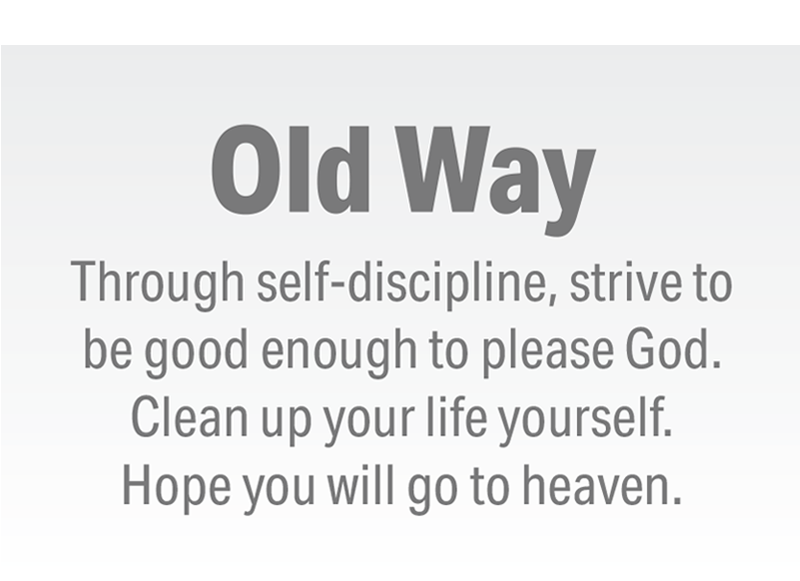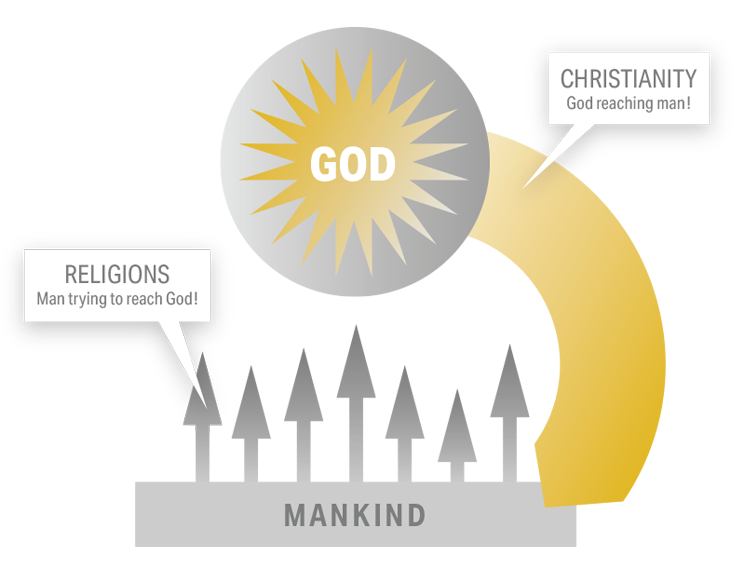OFFER AND ACCEPTANCE IS A PRINCIPLE OF LIFE
Our whole society functions on the basis of offer and acceptance. This is the basis of all contractual relationships. For example:
- A dealer offers merchandise... a buyer accepts by paying the price and taking the merchandise.
- A person offers his time and skills to a company... the company accepts by hiring him.
- A man offers to be the woman’s husband... the woman accepts by marrying him.
God’s way of dealing with us is not illogical or unrelated to these kinds of ordinary human contractual experiences. Every day we are bombarded with offers, which we either accept or reject, consciously or subconsciously. The quality of our life depends upon which offers we accept and which we reject.
The Bible says clearly and repeatedly that salvation (from hell) is an offer from God. We understand because we have already learned the concept of offer and acceptance from our dealings with other people.
AN OFFER IS WITHOUT BENEFIT UNTIL ACCEPTED
The best offer in the world is worthless unless it’s accepted. In legal terms, there’s no deal without offer and acceptance.
It’s of no consequence that a person is too busy to hear or fully understand the offer. If he has notice that an offer is being made, it’s his responsibility to investigate it. Failure to investigate means forfeiting all benefits that could accrue from it.
IGNORING AN OFFER IS SAME AS REJECTING IT
Future intentions don’t count. Even though a person may plan to investigate an offer at some later time, the fact is that every offer is rejected unless or until it is accepted. Ignoring or procrastinating is a form of rejection.
By not accepting now, a person is at risk of having the offer withdrawn or facing changed circumstances. God’s offer of new life terminates upon our death, which could happen quickly and unexpectedly, leaving us with no second chance. Ignoring God’s offer now is a foolish risk.
A FREE GIFT IS BEST POSSIBLE KIND OF OFFER
A gift is a particular type of offer. It’s given without requirement that something be given in return. But even with a gift, there’s no way to get the benefits without accepting it. A gift is never forced upon a person – it’s only offered.
The Bible says that salvation is an offer from God… but more than that, it’s a FREE gift. But just knowing that a gift is available doesn’t make it ours. We have to reach out and personally take it.
GOD DOESNʼT ACCEPT COUNTER OFFERS
When a person doesn’t like an offer and proposes something else, he has rejected the original offer and made a counter offer.
It’s effrontery when we do this to God. His offer is spelled out in the Bible and it’s the same offer to everyone. God doesn’t entertain counter offers and a person deludes himself by thinking he can negotiate a special deal with God.

MOST AMAZING ʻPRODUCTʼ IS OFFERED BY GOD
It demeans God’s plan to make it ordinary and mundane; to present it as a commercial product. That’s why, in awe and respect for the majesty of Almighty God, special theological terms are used to explain him and his dealings with us.
Jesus sometimes used illustrations from the commercial world of his day (sower, vineyard, shepherd) to help explain the plan. So, for just a moment, without being disrespectful, let’s re-state God’s offer in a format that would be common in our product-dominated world today.
‘Salvation’ is the respectful theological term and concept, but a ‘New Life product’ is the way a secular person might think about it:
How important is it? Nothing is more important than our happiness now and our eternal destiny after death.
Who’s offering it? The designer and creator of the universe! If God is capable of designing an incredible universe which we personally observe and use every day, we have confidence that he’s capable of designing an excellent and eternal life for us. No product carries a better name!
What are the benefits? As summarized in the box above, the benefits are absolutely amazing. Properly understood, everyone wants these benefits, but no other product or service can give them.
What’s the price? The ‘free’ part is appealing, but the ‘confession’ part is hard on the ego and is probably the biggest reason why some people don’t want it. No one can take credit for it and there’s no personal status in it.
How do I get it? Even though the product is free, no one gets it automatically. If a person wants it, he must humble himself before God and ask for it in a personal encounter with him (a specific confession in a specific prayer – see Topic 62). Most people either don’t understand the need for this personal encounter or they postpone the encounter because they think they have to clean up first or have other pressing things to do first. A product offered does no good until actually accepted and received; therefore procrastination has the same effect as rejection.
Hereʼs a sampling of what the Bible says on this subject.
John 3:16, John 3:36, John 6:40
ʻWhoever believesʻ are key words for eternal life
John 3:36
Indecision about Christ is a decision against him
Revelation 3:20
God is standing at the door of our life, asking if we will accept his offer and let him in
For help, see Topic 29.










 The common notion, even among many who regard themselves as Christians, is that if there’s a preponderance of good deeds in a person’s life, he’ll go to heaven... and if there’s a preponderance of bad deeds he’ll go to hell.
The common notion, even among many who regard themselves as Christians, is that if there’s a preponderance of good deeds in a person’s life, he’ll go to heaven... and if there’s a preponderance of bad deeds he’ll go to hell.

 Justice is closely related to holiness and love rather than being a contrasting principle. When there are many things sharing common time and space – whether atoms in molecular orbit or people in a city – laws are needed to prevent chaos. Good laws are motivated by love, for the benefit of all.
Justice is closely related to holiness and love rather than being a contrasting principle. When there are many things sharing common time and space – whether atoms in molecular orbit or people in a city – laws are needed to prevent chaos. Good laws are motivated by love, for the benefit of all.
 The Bible says that God has a deep and tender feeling of affection and attachment for each of us, and he has an enduring concern for our individual well-being.
The Bible says that God has a deep and tender feeling of affection and attachment for each of us, and he has an enduring concern for our individual well-being. This agape kind of love means much more than warm feelings. It means thoroughly enjoying a deep and intimate relationship and giving unselfishly in practical ways to meet the needs of the loved one.
This agape kind of love means much more than warm feelings. It means thoroughly enjoying a deep and intimate relationship and giving unselfishly in practical ways to meet the needs of the loved one.
 By observing the universe, we see that God operates by intricate principles and meticulous order – we call them laws (rules governing the relationship of things). The Bible says that God conducts his world according to physical laws and spiritual laws.
By observing the universe, we see that God operates by intricate principles and meticulous order – we call them laws (rules governing the relationship of things). The Bible says that God conducts his world according to physical laws and spiritual laws.